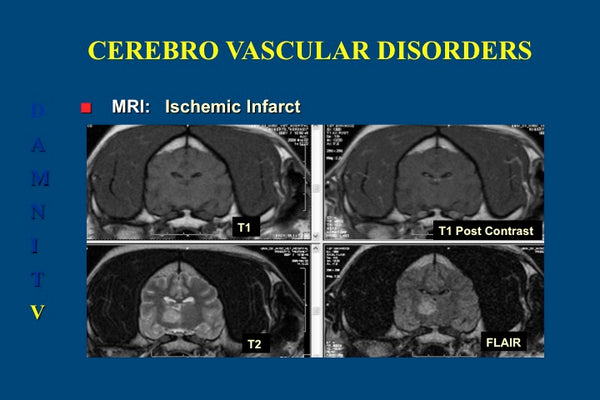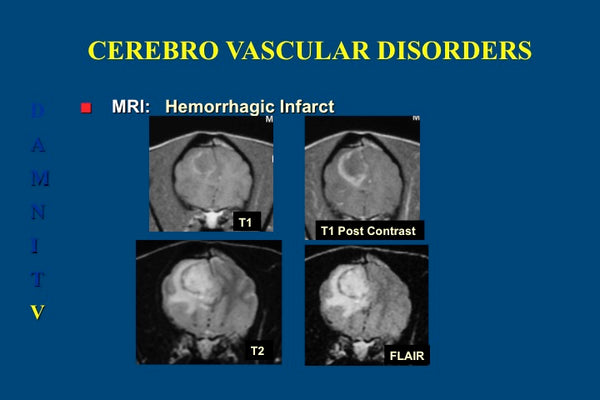Stroke vs Vestibular Disease in Older Dogs


Vestibular Syndrome is the sudden loss of balance accompanied by disorientation, rapid eye movements and a head tilt, making walking difficult, if not impossible. Most dogs fully recover in 2-3 weeks, with some dogs showing residual symptoms, such as a head tilt, for life. The most severe clinical signs tend to occur within the first 24 - 48 hours.
Stroke or cerebrovascular accident (CVA) is the most common clinical manifestation of cerebrovascular disease, and can be broadly divided into ischemic stroke (sudden lack of blood supply to the brain) and hemorrhagic stroke (burst blood vessel). Signs of a stroke can also include loss of balance, head tilt and difficulty in walking. Performing an MRI is often used to diagnose a stroke and to differentiate the clinical signs from other brain diseases that require more specific treatments.

Just as with human beings, our senior dogs tend to be more at risk due to the higher prevalence of underlying conditions that may lead to a vascular event (ischemic stroke or hemorrhagic stroke).
While the symptoms of Vestibular Syndrome are always the same, the underlying cause may be different. Underlying causes can include a stroke, infectious diseases, inflammatory diseases etc. If the stroke affects the brainstem or the cerebellum it may cause Vestibular Syndrome. However, strokes may also affect the forebrain, in this event the clinical signs are not associated with Vestibular Syndrome.
While there is little that can be done to prevent a stroke or vestibular disease, the underlying cause may be treatable thus reducing the overall risk of a vascular event.
Once a stroke or vestibular disease is diagnosed, most treatment protocols include supportive care and time. Medication to help with the dizziness may be prescribed and it is very important that your dog has supervision at all times to ensure they do not hurt themselves during this time of disorientation. There are many dogs that do recover to live long, full lives; it really depends on the underlying condition, age and overall health of your dog.
I still remember how I had to carry Mackenzie everywhere because he could barely stand. I often kept him in his Dogger stroller when indoors so he had a great view of everyone and everything, while staying out of harms way. I tried using a walking sling, but he was so unbalanced that even a sling did not help so I stuck with using my hands. I'd hold him to eat, to drink, to take care of his 'business' outside and I would have done it for a lifetime if needed.
My only wish was that I better understood what happened to him and the more I read on the subject, the more I see the need for greater research. We have come such a long way with humans, but have only started to scratch the surface when it comes to strokes in dogs - at least we now acknowledge that strokes in dogs do in fact happen and isn't admitting we have a problem the first step in recovery?
*MRI Images courtesy of Dr. Filippo Adamo, DVM, Dipl. ECVN, East Bay Veterinary Specialists, Walnut, CA
Ann-Marie Fleming is the Founder & CEO of Dog Quality, a provider of products focused on improving the quality of life for older dogs.

